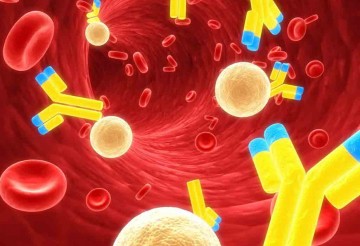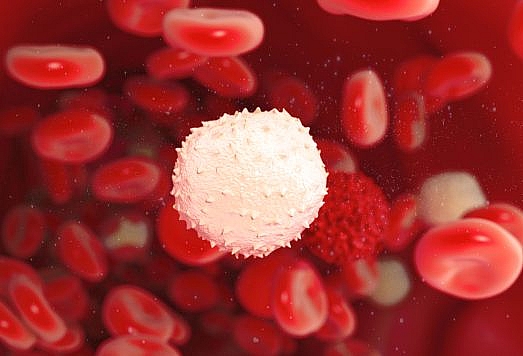Vitamin C
Vitamin C is an essential micronutrient for humans, which cannot be synthesized by humans due to loss of a key enzyme in the biosynthetic pathway. Research over the past 50 years has shown that vitamin C is a crucial player in various aspects of the immune system, particularly immune cell function.
Vitamin C has a number of activities that could conceivably contribute to its immune modulating effects. It is a highly effective antioxidant, due to its ability to readily donate electrons, thus protecting important biomolecules (proteins, lipids, carbohydrates, and nucleic acids) from damage by oxidants generated during normal cell metabolism and through
exposure to toxins and pollutants (e.g., cigarette smoke).

The Immune System
The immune system is a multifaceted and sophisticated network of specialized organs, tissues, cells, proteins, and chemicals, which has evolved in order to protect the host from a range of pathogens, such as bacteria, viruses, fungi, and parasites, as well as cancer cells. It can be divided into epithelial barriers, and cellular and humoral constituents of either innate (nonspecific) and acquired (specific) immunity.
Barrier Integrity and Wound Healing
Vitamin C supports epithelial barrier function against pathogens and promotes the oxidant scavenging activity of the skin, thereby potentially protecting against environmental oxidative stress. The skin has numerous essential functions, the primary of which is to act as a barrier against external insults, including pathogens. Vitamin C appears to be particularly essential during wound healing, also decreasing the expression of pro-inflammatory mediators and enhancing the expression of various wound healing mediators. The elevated antioxidant status of the skin following vitamin C supplementation could potentially protect against oxidative stress induced by environmental pollutants. The antioxidant effects of vitamin C are likely to be enhanced in combination with vitamin E. Cell culture and preclinical studies have indicated that vitamin C can enhance epithelial barrier functions.
Vitamin C and Innate Immunity
Vitamin C contributes to immune defence by supporting various cellular functions of both the innate and adaptive immune system. Leukocytes, such as neutrophils and monocytes, part of innate immunity, actively accumulate vitamin C against a concentration gradient indicating important functions within these cells. Accumulation of vitamin C into neutrophils is thought to protect these cells from oxidative damage.
Leukocytes, particularly neutrophils and monocyte-derived macrophages, are major players in wound healing. Vitamin C is thought to influence several important aspects of neutrophil function: migration in response to inflammatory mediators (chemotaxis), phagocytosis (uptake of material) and killing of microbes, and apoptosis (cell death) and clearance by macrophages.
Phagocytosis and Microbial Killing
Once neutrophils have migrated to the site of infection, they proceed to engulf the invading pathogens (phagocytosis). Microbial killing function by neutrophils from volunteers with inadequate vitamin C status can be enhanced following supplementation with a dietary source of vitamin C and increases of other functions (i.e. uptake of pathogens) were observed following supplementation of elderly participants with a combination of vitamin C and E.
Vitamin C and Adaptive Immunity
Like phagocytes, B- and T-lymphocytes, part of adaptive immune system, accumulate vitamin C to high levels. The role of vitamin C within these cells is less clear, although antioxidant protection has been suggested. In vitro studies have indicated that incubation of vitamin C with lymphocytes promotes proliferation, resulting in enhanced antibody generation, and also provides resistance to
various cell death stimuli.
Vitamin C and Infection
Vitamin C deficiency results in impaired immunity and higher susceptibility to infections. In turn, infections significantly impact on vitamin C levels due to enhanced inflammation and metabolic requirements. Furthermore, supplementation with vitamin C appears to be able to both prevent and treat respiratory and systemic infections by enhancing various immune cell functions. Preclinical studies have shown that vitamin C enhances several essential factors involved in normal lung function. Furthermore, supplementation of vitamin C in the common cold episode is suggested to be beneficial for the recovery process.
Vitamin C is also a cofactor for the hydroxylase enzymes involved in the synthesis of catecholamine hormones, e.g., norepinephrine, and amidated peptide hormones e.g.,vasopressin, central to the cardiovascular response against severe infections.
Vitamine C is necessary for the immune system to mount and sustain an adequate response against pathogens, whilst avoiding excessive damage to the host.
Source: Carr et al. Vitamin C and immune function. Nutrients 2017
For clarifications, more information and/or questions you can contact dr. Vinod Sommandas, CEO/Wellbeing Tutor Vedanta Wellbeing PhD via info@wellbeingphd.com.









